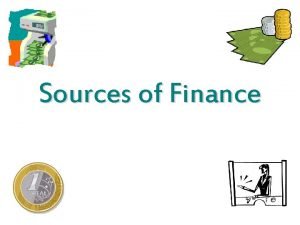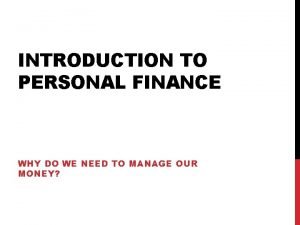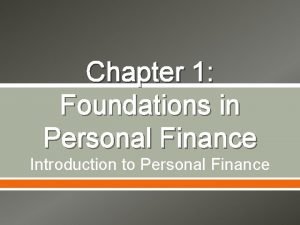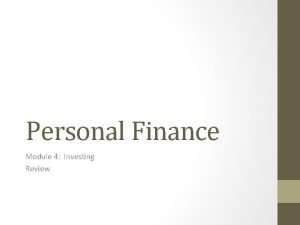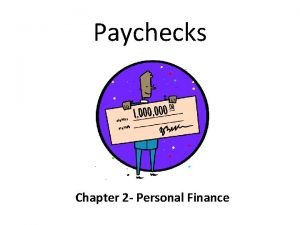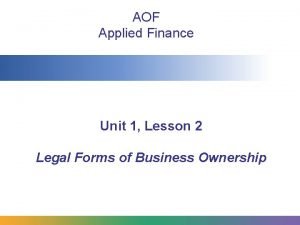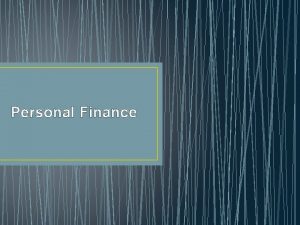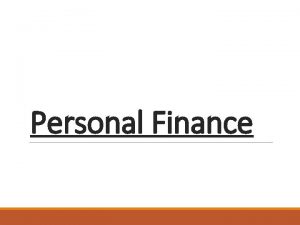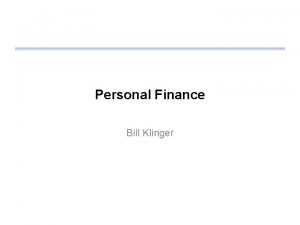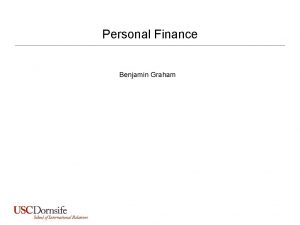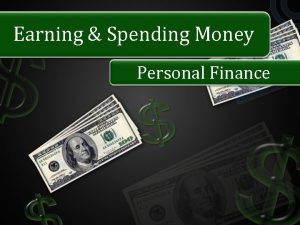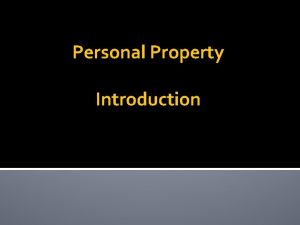INTRODUCTION TO PERSONAL FINANCE WHY DO WE NEED












- Slides: 12

INTRODUCTION TO PERSONAL FINANCE WHY DO WE NEED TO MANAGE OUR MONEY?

TODAY’S OBJECTIVE Personal finance impacts whether or not people meet their personal goals.

WHAT IS PERSONAL FINANCE? - A personal finance plan includes financial goals and a budget, including spending on goods and services, savings and investments, insurance and philanthropy. - More than budgeting, more than investing - It is a thinking process; an on-going thinking process

DECISIONS, DECISIONS - Your personal beliefs about money are major forces that guide your spending decisions and goals. - Personal finance is a roadmap in guiding you through your financial life. - You need to consider your career, salary, budget, savings plan, retirement plan, and goals. - It is never too early to start thinking about your personal finance goals!!!

HOW DO I BEGIN? - Think about a potential career and how you can obtain that career - Look at your current financial situation - Develop financial goals - Identify all of your options - Evaluate alternatives - Create and use a financial plan of actions - Review, revise, review, and revise you plan (this happens periodically)

DETERMINE YOUR CURRENT FINANCIAL SITUATION 1. Determine your current financial situation Make a list of items that relate to your finances: - savings/investment - monthly incomes (job earnings, allowance, gifts, interest) - Monthly expenses - Debts

DEVELOP YOUR FINANCIAL GOALS 2. Develop your financial goals. Consider your attitude toward money. Ask yourself the following: - How do I determine if it is more important to spend money now, or save it for the future? - How do your personal values affect your financial decision?

IDENTIFY YOUR OPTIONS 3. Identify your options - Continue the same course of action - Expand the current situation - Change the current situation - Start something new

EVALUATE YOUR ALTERNATIVES - Consider the risks and consequences of each decision you make - 1. Be aware of all sources of financial information - 2. Evaluate consequences of choices, both good and bad. - 3. Understand risks involved with choices

CREATE, REVIEW, AND REVISE Create and use your financial plan Just do it!!!!!! Review and revise your plan - As we get older and our circumstances, our finances, needs, and wants will change, therefore our financial plan must be flexible as well.

WHAT INFLUENCES YOUR GOALS? - Our society - Our culture - Your emotions - Financial resources - Peer pressure (advertising for products, what you see others buy) - Scarcity (not enough resources to fulfill our needs) - Wants and Needs

WHY PERSONAL FINANCE GOALS ARE IMPORTANT? - Good financial behavior reaps many benefits: - Security - Ability to achieve goals - Less worry about finances - If bad financial behavior occurs the following can happen: - Bankruptcy - Debt - Job less - Inability to pay bills
 Sources of finance
Sources of finance Pictures
Pictures Personal finance lab
Personal finance lab Foundations in personal finance chapter 1
Foundations in personal finance chapter 1 Dont ask why why why
Dont ask why why why Affection and approval
Affection and approval Module 4 investing
Module 4 investing Chapter 2 personal finance
Chapter 2 personal finance Personal finance gcse
Personal finance gcse Mypersonalfinancelab
Mypersonalfinancelab Beebusinessbee unit 3
Beebusinessbee unit 3 Personal finance lab
Personal finance lab Personal finance unit 4 lesson 2 business plans
Personal finance unit 4 lesson 2 business plans
